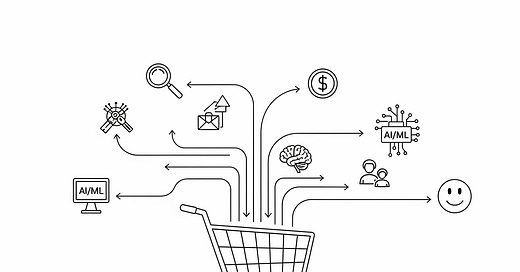How Data Science is Transforming the E-commerce Industry
From clicks to conversions: Discover how data science is revolutionizing online retail, enabling hyper-personalization, intelligent operations, and unprecedented growth. 📈🛒
The e-commerce landscape is a vast, dynamic arena where millions of transactions occur every second. In this competitive environment, mere presence is no longer enough; success hinges on understanding, anticipating, and delighting the customer at every touchpoint. This is where Data Science steps in, acting as the silent, powerful engine driving innovation and efficiency in the online retail world.
Data science, a multidisciplinary field leveraging statistics, machine learning, and advanced analytics, is transforming raw transactional and behavioral data into actionable insights. It's helping e-commerce businesses move beyond guesswork, enabling them to make smarter decisions, optimize operations, and create truly personalized experiences that convert browsers into loyal customers. At Functioning Media, we recognize data science as the bedrock of modern e-commerce success. This guide explores the profound ways data science is reshaping the industry, from predicting trends to perfecting customer journeys.
What is Data Science in E-commerce?
In the context of e-commerce, data science involves collecting, processing, and analyzing vast amounts of data generated from online interactions. This includes customer Browse history, purchase patterns, search queries, product reviews, social media activity, inventory levels, competitor pricing, and much more.
The core purpose is to extract meaningful patterns and insights from this data to:
Understand customer behavior: What do they want? When do they buy? Why do they abandon carts?
Optimize business operations: How to manage inventory, set prices, and streamline logistics?
Personalize experiences: How to make each customer feel uniquely valued?
Drive strategic decisions: Where to invest next? What new products to launch?
Key Ways Data Science is Transforming E-commerce
Data science applications are woven into nearly every aspect of the e-commerce value chain:
1. Hyper-Personalized Recommendations 🛍️
How it works: Data science powers recommendation engines (like Amazon's "Customers who bought this also bought...") by analyzing Browse history, purchase behavior, demographics, and even real-time clicks.
Impact: Drives cross-selling and up-selling, increases average order value, and enhances customer discovery,making the shopping experience highly relevant and engaging.
2. Intelligent Customer Segmentation & Targeted Marketing 🎯
How it works: Machine learning algorithms group customers into segments based on shared characteristics (e.g.,spending habits, product preferences, loyalty). This enables highly targeted marketing campaigns.
Impact: Ensures marketing messages, promotions, and product launches reach the most receptive audience,increasing campaign effectiveness and ROI.
3. Demand Forecasting & Optimized Inventory Management 📦
How it works: Data scientists use historical sales data, seasonal trends, promotions, market events, and even weather patterns to predict future demand with high accuracy.
Impact: Minimizes stockouts and overstocking, reduces warehousing costs, prevents lost sales, and ensures timely product availability, leading to smoother operations and happier customers.
4. Dynamic Pricing Strategies 💲
How it works: Algorithms continuously analyze factors like competitor pricing, customer demand, inventory levels, time of day, and even individual customer segments to adjust product prices in real time.
Impact: Maximizes revenue and profit margins, remains competitive, and adapts quickly to market fluctuations.
5. Fraud Detection & Enhanced Security 🔒
How it works: Data science models identify unusual patterns in transactions, user behavior, and payment information that may indicate fraudulent activity (e.g., multiple transactions from different locations in a short period).
Impact: Reduces financial losses due to fraud, protects customer data, and builds greater trust and confidence in the online platform.
6. Optimizing Customer Experience (CX) & Support 💬
How it works: Natural Language Processing (NLP) analyzes customer reviews, chat transcripts, and social media sentiment to identify common pain points, product issues, or areas for improvement. AI-powered chatbots provide instant support.
Impact: Improves customer satisfaction, proactively addresses problems, streamlines support operations, and gathers valuable feedback for product development.
7. Supply Chain & Logistics Optimization 🚚
How it works: Data science optimizes warehousing, routing, and delivery networks by analyzing traffic patterns,delivery times, warehouse locations, and supplier performance.
Impact: Reduces shipping costs, improves delivery speed, and enhances the overall efficiency of the supply chain.
8. Enhanced Search and Discovery 🔎
How it works: AI algorithms refine internal search results by understanding user intent, correcting typos, and learning from past search queries and clicks. Visual search allows users to find products by uploading images.
Impact: Improves product discoverability, reduces user frustration, and increases conversion rates by helping customers find exactly what they're looking for faster.
Benefits for E-commerce Businesses 🌟
Embracing data science provides a significant competitive edge, leading to:
Increased Revenue & Sales: Through personalization, optimized pricing, and targeted marketing.
Improved Operational Efficiency: Better inventory management, fraud prevention, and supply chain optimization.
Enhanced Customer Satisfaction & Loyalty: Delivering tailored experiences and proactive support.
Reduced Costs: Minimizing waste, preventing fraud, and optimizing logistics.
Smarter Decision-Making: Moving from intuition to data-driven strategies.
Challenges in Implementing Data Science 🚧
While the benefits are immense, implementing data science in e-commerce comes with its challenges:
Data Quality & Integration: Ensuring clean, consistent data from disparate sources.
Talent Shortage: Finding skilled data scientists and engineers.
Infrastructure: Building robust data pipelines and scalable computing resources.
Data Privacy & Security: Adhering to regulations (e.g., GDPR) and protecting sensitive customer information.
Organizational Adoption: Fostering a data-driven culture across departments.
The e-commerce industry is experiencing a data revolution, with data science at its forefront. By harnessing the power of data, businesses can gain unparalleled insights into their customers and operations, paving the way for truly intelligent, adaptive, and customer-centric online retail experiences. The future of e-commerce is undeniably data-driven.
Ready to leverage the power of data science for your e-commerce business? Visit FunctioningMedia.com for expert data science consulting and solutions tailored for online retail, and subscribe to our newsletter for the latest industry insights!
#DataScience #Ecommerce #RetailTech #MachineLearning #Personalization #BigData #AIinEcommerce #DemandForecasting #OnlineRetail #FunctioningMedia





